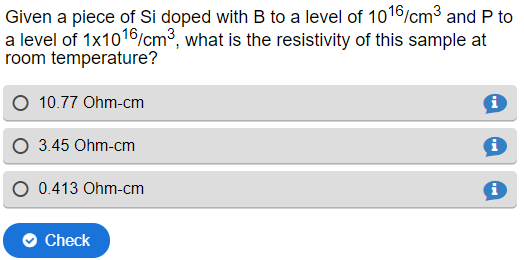It is a truth generally acknowledged that students hate being tested about as much as they benefit from being tested. How is it then that Engineering professor Kris Campbell has received student feedback on math quizzes in her ECE 245 course such as this: “These problems are very engaging and fun to work through, and I think they offer great insight on applying what we learned!” One way to help students perform better on an upcoming exam and decrease anxiety is to give them opportunities to practice with ungraded and untracked quizzes.
“These problems are very engaging and fun to work through, and I think they offer great insight on applying what we learned!”
Kris Campbell
An Example
Kris created a number of ungraded practice problems and embedded them into a Canvas page in her course. The example below (try quiz on pressbooks) may look like a simple multiple choice question. However, there are a few things that make it different than a typical Canvas quiz. Specifically:
- The questions weren’t built in Canvas, but with a tool called H5P;
- Instead of appearing in a separate quiz window, the questions are embedded right after relevant course content;
- Quiz results are never recorded, so the professor does not know how many times the student attempted the question, or even if the student answered correctly;
- Feedback comes immediately after the student chooses an answer to each question, not at the end of a set of questions.

A Closer Look
What is it about Kris’ approach that works? When introducing new math content in her online course, Kris presents students with text-based explanations, followed by short lecture videos, example problems with the solutions worked out, and finally a graded quiz. The critical component to Kris’ method is the addition of ungraded practice quizzes between the worked solutions and the graded quiz. The practice quizzes are embedded into the Canvas page that contains the worked examples, so students are encouraged to interact with them. This also allows them to quickly compare the example problems and solutions to the practice questions. Additionally, detailed solutions for each practice quiz question are provided so students can see exactly how the professor would solve them.
The use of these ungraded practice quizzes provides students with several benefits:
- Students get acquainted with the quiz questions since the practice quizzes are presented in the same format as the worked examples and the graded quiz questions;
- Anxiety is reduced since students can practice in a penalty-and-judgement-free environment before taking a quiz for points;
- Students get performance feedback after attempting each practice quiz question, allowing them to adjust their approach before answering the next question;
Evidence Based Practice
Kris’ approach works for her students, and research supports it. Empirical studies have shown that we can improve our ability to remember class content if we test ourselves as we are learning (Roediger & Karpicke, 2006a; Roediger & Karpicke, 2006b). One study of an introductory psychology course (N=140) found that when it came to final exam grades, students taking ungraded quizzes outperformed students taking graded practice quizzes and students taking no quizzes at all (Khanna, 2015). In addition, the students taking the ungraded quizzes reported positive feelings about the quizzes. In another study of six undergraduate psychology classes (N = 249) all taught by the same professor, students performed significantly better on exams when they used ungraded quizzes rather than graded quizzes (Wickline & Spektor, 2011), when correct answers to the quizzes were provided.
How-to Resources
For step-by-step instructions on how to create practice quizzes in H5P for free and embed it into your Boise State Canvas course, see this article:
To see examples of content you can create in H5P, click:
For help designing and integrating these kinds of activities into your course, contact eCampus Center and request a consultation.
Article Credit
Thanks to Dr. Kris Campbell and Greg Snow, the Instructional Design Consultant who worked with Kris to implement the H5P practice quizzes into her course.
References
Khanna, M. M. (2015). Ungraded pop quizzes: Test-enhanced learning without all the anxiety. Teaching of Psychology, 42(2), 174–178. https://journals.sagepub.com/doi/10.1177/0098628315573144
Roediger, H.L., & Karpicke, J.D. (2006). Test-enhanced learning: Taking memory tests improves long-term retention. Psychological Science, 17(3). 249-255.
doi: https://journals.sagepub.com/doi/10.1111/j.1467-9280.2006.01693.x
Roediger, H.L., & Karpicke, J.D. (2006). The power of testing memory: Basic research and implications for educational practice. Perspectives on Psychological Science. 1(3). 181-210. doi: https://journals.sagepub.com/doi/10.1111/j.1745-6916.2006.00012.x
Wickline, V. B., & Spektor, V. G. (2011). Practice (rather than graded) quizzes, with answers, may increase introductory psychology exam performance. Teaching of Psychology, 38(2), 98–101. https://journals.sagepub.com/doi/10.1177/0098628311401580